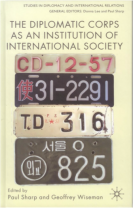The War of the Goldsmith's Daughter
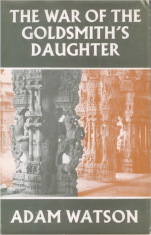
Watson, Adam. The War of the Goldsmith's Daughter. London: Chatto and Windus, 1964.
This book relates the dramatic story of the Moslem conquest of Southern India and its consequences. It pays particular attention to the rise of a new militant Hindu Empire that became the most powerful state in all India, and its struggle with its great Moslem rival, the Bahmani Sultanate. The war itself, caused by the desire of the young Hindu Emperor for a beautiful girl who later married the Sultan's son, is treated in detail to give a picture of the civilisation, the politics and the personalities of a period when great prizes were the reward of ability and luck. Agincourt was fought in 1415: the War of the Goldsmith's Daughter was waged in 1406. In choosing to write in detail about this particular war, Watson was able both to typify Indian conditions and to make an interesting comparison with those in the Europe of the Hundred Years' War. The book offers a new evaluation of the period from 1300 to 1450, and incorporates the results of modern research on the most striking age of South Indian history.
Emergent Africa
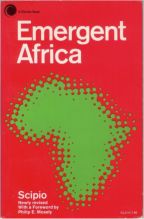
Watson, Adam. Emergent Africa. New York: Simon & Schuster, 1965. Published under the pseudonym Scipio Foreword by Philip E. Mosely, The European Institute, Columbia University.
Writing under the name "Scipio," a European diplomat and scholar with many years' experience in African affairs has produced a brilliant and invaluable primer of contemporary Africa. In this newly revised edition, he describes the problems that the newly independent nations face in building stable economies and in reconciling their desperate need for outside help with their natural desire for independence and their deep-seated fear of "neo-colonialism." With clarity and balance, he examines emergent Africa's colonial legacy, political structures, technical deficiencies, economic development, educational programs and the genesis and prosecution of its foreign policies vis-a-vis the West. "No study that I have seen has given as thoughtful an account of the contradictory strains within the foreign policies of the African states." Philip Mosely
The Nature and Problems of the Third World
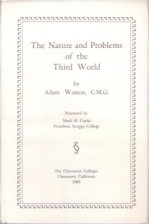
"Among the momentous changes that have overtaken the world in the twentieth century, none is more profound and none will have a more lasting effect than the passing of colonial empires and the emergence of new nation-states in their stead. This complex movement began at the moment in the late nineteenth century when colonial empires had reached the height of the development. I quickened pace as a result of the first world war, faltered during the 1930's as certain nations, "late-bloomers" in terms of world power, sought to enhance their resources and prestige through colonial adventures, and then rapidly reached fulfillment in the aftermath of the second world war. To use a musical metaphor, it developed through variations on a contrapuntal theme in which Western political, constitutional, economic, and educational ideals interlaced with awakened self-awareness and growing self-confidence among colonial peoples to produce struggles that where both life-giving and embittering. The outcome of this movement has left both the Western world and the former colonial world, or the Third World as it is called so appropriately in these essays, in a transitional state that presents all peoples and statesmen with promising prospects as well as hazardous pitfalls." From the foreword by Mark Curtis, President, Scripps College
Diplomacy: The Dialogue Between States
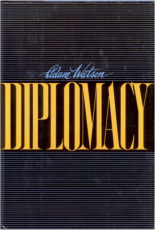
A major new assessment of the diplomatic dialogue through which the present international society of independent states is organized and through which its rules and institutions are established and revised. The negotiations and compromises of diplomacy are conducted by statesmen, with embassies and foreign offices as their agents and advisers. Mr. Watson discusses the close involvement of diplomacy with laws and justice and with power and the balance of power=, and the conflict between diplomatic bargaining and the rigidity of ideology. He races the changing techniques of diplomatic from the ancient times through the "diplomatic society" of Europe to the present global system and pays special attention to the extension of the dialogue into new fields
The Expansion of International Society
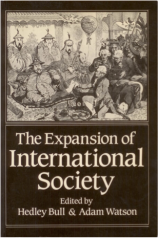
Watson, Adam, and Hedley Bull, eds. The Expansion of International Society. New York: Oxford UP, USA, 1985.
This book is a systematic investigation of the origins and nature of the international society of today. The work of a study group of distinguished scholars, it examines comprehensively the expansion of the European states across the rest of the globe, which united the whole world for the first time in a single economic, strategic, and political unit; and the subsequent transformation of that international society, fashioned in Europe and dominated by Europeans, into the one we know today, where European, Russian and American domination is repudiated by the states and peoples of the Third World. The last part of the book focuses on the question of whether the geographical expansion of international society has been accompanied by a contraction of consensus about the rules governing international behaviour; or whether a new, genuinely universal and non-hegemonial structure for international relations has taken root.
The Evolution of International Society
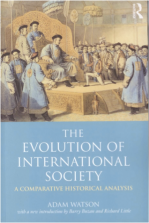
This uniquely comprehensive historical study analyses and explains how international societies function. After examining the ancient states systems, Watson looks in more detail at the European society of states and at our worldwide contemporary society, which grew out of it. The book demonstrates that relations between states are not normally anarchies, but organized international or supernational societies regulated by elaborate rules and practices, which derive substantially from experience. Our present international society, for all its individuality, is the latest in the series.
Watson, Adam. The Evolution of International Society: A Comparative Historical Analysis Reissue with a new introduction by Barry Buzan and Richard Little. New York: Routledge, 2009. Republished posthumously with a new introduction by Barry Buzan and Richard Little.
The Limits of Independence
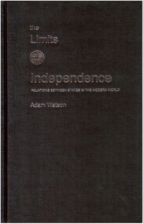
Nation states are not as independent as is usually supposed. Their freedom of action is curbed by their inextricable involvement in a states system and by the rules and institutions which they put in place to manage their relations. Watson's analysis is especially concerned with how the hegemonial authority of the richest and strongest powers also increasingly determines both the external and internal behaviour of nominally independent states. After setting out the general framework of restraint imposed on states, the book looks in detail at attempts to limit national sovereignties in Europe by creating an overarching supranational authority, from Napoleon to the European Union. Outside Europe ex-colonial states have found their nominal independence limited by their inability to provide strategic security or economic well-being for their peoples. The aid they need subjects them to hegemonial pressures on economics, human rights and the environment. Watsons' analysis draws on his wide personal experience as a diplomat, historian and human rights worker. This book continues his landmark achievement of pushing the study of international systems beyond sovereign states to the realities of hegemony and supranational authority.
Hegemony & History
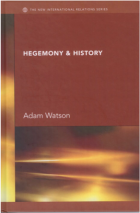
This fascinating collection traces the development of Watson's thinking on international theory and politics from the 1950s to the present. ITs primary focus is on how present and past hegemonial systems function. The quest also led him to explore a range of topical issues including: - The behaviour of states in international systems and societies - Justice - Non-state relations, including the economic involvement of communities and the role of other non-state actors - Aid and intervention - The increasing focus of international politics on individuals as well as states. This book will be of strong interest to students and researchers of international relations, political science, history and economics, as well as diplomatic practitioners and others concerned with international affairs.
The Origins of History (ed. Watson)
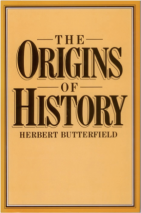
This book, edited and published posthumously on behalf of Butterfield by Watson with an introduction by Watson, is a distillation of twenty years of the thought and research that Herbert Butterfield devoted to the beginnings of historical awareness. It addresses the question: When did man first attempt to acquire a "past" and endow it with meaning?
The British Committee on The Theory of International Politics
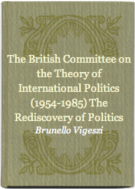
Both the structure of the debates in the British Committee and Watson's role in them as a founding member and a vital force in the development of thought have been made available through Vigezzi's book.
The Diplomatic Corps as in Institution of International Society (fwd by Watson)
